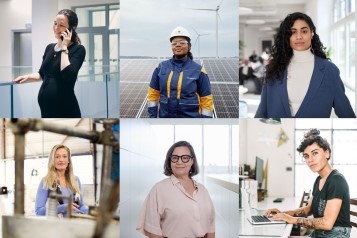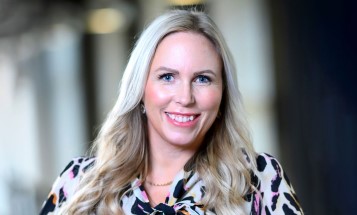It’s 2016 and many employees are still in the closet at work. So, how liberal and open are we at Vattenfall?
The numbers suggest that any company is likely to have between 7 to 10 per cent homosexual employees. That corresponds to their statistical proportion in the population as a whole. In political and legal respects in Western Europe, LGBTs (lesbian, gay, bisexual and trans people) are increasingly accepted and treated equally. Nevertheless, various studies show that many employees, even in supposedly liberal countries, still do not dare to be open about their homosexuality at the workplace.
News from Vattenfall set out to find out how LGBT employees fare at Vattenfall. In Germany, Sweden and the Netherlands, we spoke with managers, colleagues, social counsellors, the HR department and LGBT networks. We met people who accept their sexuality and talk openly about it, but we also met employees who told us about prejudices and constraints they still face.

Thomas Gustafsson works in Berlin and is Head of Risk Governance
I am open about my homosexuality. In fact, I came out to my colleagues shortly after joining Vattenfall. There were no negative or hostile reactions. When my colleagues talk about their families and their heterosexual partners, I will happily participate and tell them about my partner.
I believe that if anybody at Vattenfall would discriminate against somebody because of their sexual orientation they would face extremely serious consequences.
Is it easier to come out as a manager?
Well, if it is indeed easier, it could be due to the fact that as a manager you have to have a realistic perspective of yourself. If you want to be open with your employees as a manager, it makes sense that you should be open with yourself first.

Niels van Campenhout works as a Contract & Supplier Manager in Amsterdam
By meeting and working on projects with a number of LGBT colleagues, I quickly realised that I was able and allowed to be myself.
What more could Nuon do for LGBT colleagues?
Paying more attention to diversity and setting up a diversity network has been a good start. Everyone should feel comfortable in the workplace. By talking to each other and talking to colleagues we can all play our part.
But there’s still plenty more to be done in the Netherlands. I can see from those around me that not everyone has it equally easy.

Anonymous employee working in a Vattenfall power plant in Berlin
It’s a heterosexual, male dominated world here in the power plant. Homosexuality is a taboo.
I still have not come out because I don’t want any nasty remarks at work. If my colleagues knew that I was gay, that would only lead to trouble. On the other hand it is not fun always having to hide part of who you are.
How do you feel about the way that homosexuality is handled at Vattenfall?
Quite honestly? Taking part in a Gay Pride parade does not change anything. The situation will still be the same for me, because of the way people think here.

Henric Larsson works as a business strategist in Stockholm and manages the LGBT network within Vattenfall Sweden
A LGBT network can throw light on the issue of diversity and inclusion, which applies to all minority groups. When I ran diversity courses at BU Distribution Sweden for instance, someone questioned whether there actually were any LGBT people in the organisation – after all, what kind of job would such a person be able to do at an energy company? Similar viewpoints were aired about people with physical disabilities, or other ethnic backgrounds. These are the ideas and viewpoints that we as a company must work to eliminate.

Hester Koopmans works as a Communication Advisor Online B2C in Amsterdam
When I applied for the job at Nuon, I thought the company was probably a bit staid and set in its ways, but that completely changed when I joined. I had a really warm and positive connection with my then manager and colleagues. They also reacted positively when I told them that I was in a relationship with a woman. I immediately felt at home.
Now there’s more awareness of this topic, I think we have more opportunity to show that we embrace diversity and are against all forms of discrimination. I’m proud of that.

Anne-Marijn Wingelaar works in Alkmaar as a Consultant B2C Customer Care in the Netherlands
I always try to be open and honest about my sexual orientation and have never had any negative experiences. People have lots of questions, sometimes delicate ones, which I find quite amusing. But others often don’t dare to ask. I think it’s good to ask questions in order to increase understanding and acceptance.
I’ve never been discriminated against at Nuon on account of my sexual orientation, nor outside the company for that matter. However, I have concealed my sexual orientation on occasion in situations with clients, where it also is not really relevant. After all, it’s a business context, so it doesn’t really bother me. But if a client actually discriminated against me then I wouldn’t want to carry on doing business with them.

Tinahåkan Jönsson works in Barsebäck as a Training Instructor
It was via a newspaper interview in 2007 that his workmates at Barsebäck nuclear power plant first got to know that Tinahåkan Jönsson sometimes dresses as a woman and sometimes as a man at work. Later when he got a new nuclear power job at KSU, a Vattenfall subsidiary which trains nuclear power personnel, he wrote a coming out letter to everyone at the plant. A couple of days later, he went to work in female attire without causing any particular reactions.
“The next day when I was dressed normally again, two people from the power plant company came and said that they had spoken with my manager and would stop doing jobs for KSU if I did not stop coming to work dressed as a woman. It made me uncomfortable and I thought that my career was over, as it was quite out of the question for me to suppress my female side again.”
But the company backed him, and both his line manager and colleagues said that they supported him fully.
“I have never come across anyone at KSU who was not on my side. But when I started an LGBT network at the company, someone questioned that and said something like ‘must we really talk about sex on the job?’ It’s not about that, but about being able to talk to your colleagues over coffee about the person with whom you spend your free time over the weekend.”
Peter Andersen, Tinahåkan Jönsson’s current line manager
“We already knew this guy from earlier on in Barsebäck and were well aware of his expertise. But would we be able to work with him? After all, we were a small group of seven and it was important that we all agreed, otherwise it just wouldn’t work. The open discussion made us aware that we wanted to employ him because of his expertise and because he is a good person. The fact that he is trans was really quite irrelevant. When we came to that conclusion, it was also obvious that we would support him if there were any problems with people from outside the company. We pointed out that we could not work with such people.”

Anonymous employee works in the technical field at Vattenfall in Hamburg
I avoid questions about my private life. Whenever I talk about private activities, I stick to a first-person narrative, not mentioning my partner at all. When my partner drives me to work, we have our parting kiss some two or three blocks away from my place of work.
Only a few close colleagues are aware of my situation, but only by accident.
I feel that being gay is still “something peculiar”. You get to hear the occasional discriminatory macho views, particularly in a technological environment dominated by men. I think gay people are treated differently in many situations than if they were straight.

Ronald Stahli works as an Operational Accountant Manager B2B in Amsterdam and is a founder of the LGBT network at Nuon
Since I’m totally open about my own homosexuality, I thought it was important to do something to increase tolerance within our organisation. That’s why Kamal Bergman and I started the LGBT network within Nuon.
Last year, Nuon joined WorkPlace Pride. This organisation brings companies together through an LGBT network and organises conferences and workshops on LGBT issues. This year we have taken part in Amsterdam Gay Pride for the first time. We’re on the right track here at Nuon but, at the same time, I’m convinced that there’s still plenty more to do. To improve the situation, Nuon could make a difference by showing that the LGBT theme is an integral part of our marketing activities.

Comments from Diversity & Inclusion Officer Annika Viklund
It is hard to believe that in 2016 some would still fear not being respected for coming out as LGBT. This makes me even more convinced that we need to take inclusion and tolerance into daily life and that is done through education, role models and strong support from us all and that we show respect towards each other.

Comments from Kerstin Riesch, co-founder of the Diversity Network within Vattenfall in Germany
The discussions that we in the network are engaged in very clearly show that homosexuality is a taboo subject in the traditional technical fields.
Is there homophobia at Vattenfall?
Not to my knowledge, but this is not to say that it does not exist. I think this is partly due to the fact that many employees do not disclose their sexual orientation. Such an approach can, however, lead to self-denial, which can have a crippling effect on an individual.
National differences
Germany
In Germany, a study by the Cologne Psychological Institute found that every second homosexual employee hides their sexual orientation for fear of discrimination or lack of acceptance. Every fourth employee has experienced negative comments, every fifth even experienced harassment.
Sweden
In Sweden, same-sex lifestyles have achieved almost unanimous acceptance. And yet, a study by the Swedish National Institute for Working Life showed that in Swedish companies too, every second homosexual hides their sexual identity. 40 per cent of them avoid certain conversations due to fear of being outed.
The Netherlands
The Netherlands is perceived as being most tolerant towards homosexuality. According to a study on working conditions conducted by the Dutch Equal Treatment Commission, 80 per cent of homosexual employees have come out. However, recent surveys indicate that tolerance within the society is decreasing.



